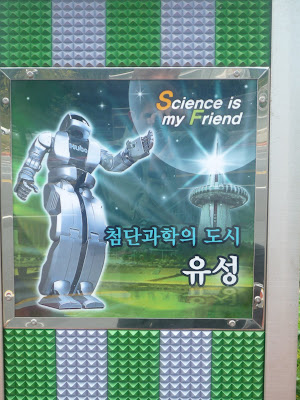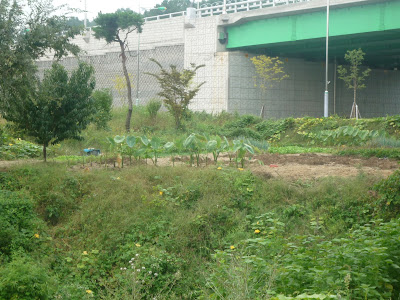Now the gardens by my house are drying out rice in front of them on the streets where a few weeks ago there were gochu peppers. There aren't any rice paddies in my neighborhood, so I'm not sure where the rice came from, maybe across the major street nearby. In any case, there was a lot of it:



 While I see a lot of small garden plots on my way to work, that's nothing compared to what I see on my bike ride to Hanwha (the chemical engineers I teach early in the morning). I live at the outskirts of town (yes, those twenty-five story apartments are the put up even at the edges of Korean cities), and on my way to Hanwha I essentially pass out of the city and into actual farms. Here too, though, every space is utilized, even the triangles of land between the exit ramp and a highway:
While I see a lot of small garden plots on my way to work, that's nothing compared to what I see on my bike ride to Hanwha (the chemical engineers I teach early in the morning). I live at the outskirts of town (yes, those twenty-five story apartments are the put up even at the edges of Korean cities), and on my way to Hanwha I essentially pass out of the city and into actual farms. Here too, though, every space is utilized, even the triangles of land between the exit ramp and a highway:

 (Also, there are two of these great posters on my way:)
(Also, there are two of these great posters on my way:)



 Even this drainage ditch is growing some sort of squash:
Even this drainage ditch is growing some sort of squash:



 One of the farms is also a tree nursery:
One of the farms is also a tree nursery:














 I doubt the rice in front of my apartment came all the way from these paddies:
I doubt the rice in front of my apartment came all the way from these paddies:

Update: Here is more rice drying, this time actually near rice paddies and taking up sidewalks on a bridge and even blocking an entire road:

































2 comments:
Are you sure the grain in the first few pictures is rice? To me, it looks like wheat or barley (http://www.qatarflourmills.com/Images/Factory/Foodco/Bakery/full_size/barley_max.jpg). But I'm not sure.
One thing I'm curious about is who owns/grows the crops on the highway exit ramps and things. Are they doing it for a living, or is it just like community gardens? Do you ever see any heavy equipment around? I'm curious because the whole rational for things like farm subsidies and such in America and Europe is that small farms (and sometimes even big farms) can't compete with poorer countires without government help. But Korea, while not having an economy quite as good per person as...
Oh, never mind. I thought South Korea had a GDP/capita that was in the same league as the US or Western Europe, but its less than half America's - more equivalent to the prosperous countries in Eastern Europe.
I have zero confidence in my ability to identify unprocessed agricultural products, so it could easily be wheat or barley.
I'm really curious about the ownership thing too. They aren't just community gardens, at least not in the sense we are used to. The people who work them seem to take it pretty seriously and for profit. I don't think that the owners of the land live in the neighborhood at all, and the workers certainly don't live in the expensive houses in the area. I'll try to find out, but my Korean friends and co-workers have not had a good track record for being able to answer my questions about how Korea works...
Post a Comment